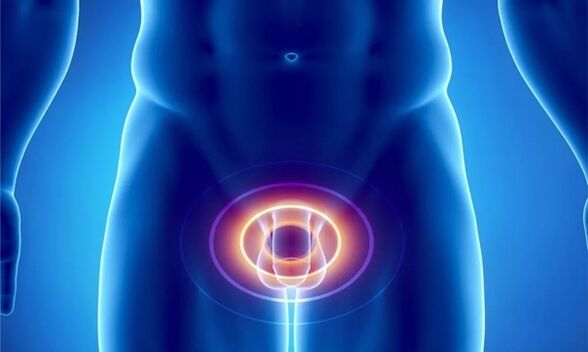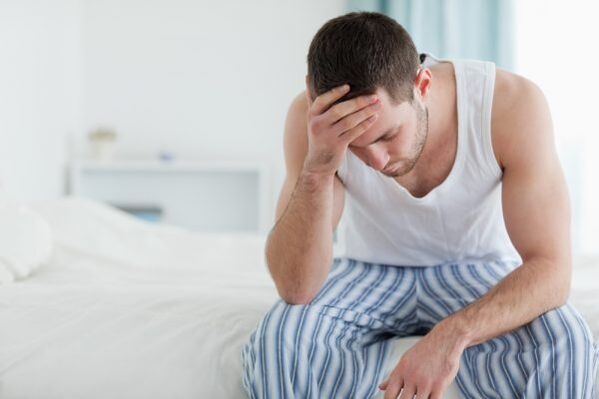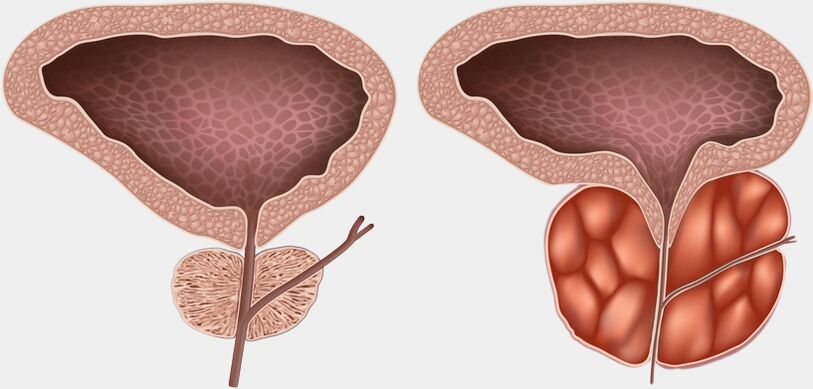
The prostate plays an important role in the functioning of the male body - it normalizes the existence of sperm, dilutes sperm, and participates in regulating hormone levels.
Today, prostatitis in men is quite widespread, according to statistics - 30% of men aged 30-55 years suffer from this pathology, which is an inflammatory phenomenon of the prostate gland.
Forms of prostatitis
Experts distinguish several types of pathology:
- Chronic bacteria - a kind of chronic pathology, caused by bacterial infections;
- Chronic abacterial - a chronic inflammatory process caused by non -infectious causes;
- Acute pathological form - an attack of chronic pain concentrated in the genital area;
- The form of asymptomatic pathology is difficult to determine, usually only after routine preventive examination.
Signs of developing prostatitis
How does prostatitis manifest itself? Usually, doctors identify 6 signs that indicate prostatitis. If a man sees at least 2 signs from this list, then he must see a doctor:
- Poor urine flow with short distances;
- Difficulty urinating;
- Painful phenomena during urination;
- Period of urination, splashing of urine, intermittent flow;
- Partial emptying of the bladder;
- Frequent urination, especially at night.
Doctors will always be able to determine the first signs of prostatitis in men and treatment after diagnosis will be done in a timely manner, with positive results.
Pathological causes
Experts talk about the following reasons for the formation of this disease:
- Weakened immunity - the protective barrier that prevents the occurrence of many viral infections is reduced;
- Infectious process - elements of viruses, microbes, bacteria through the bloodstream or lymph enter the prostate. A sign of this phenomenon is an increased temperature with prostatitis;
- Inactive lifestyle - causes disruption of blood supply, lack of oxygen;
- Disorders in blood circulation due to stagnant moments in the genital area - occur due to irregular sexual life, prolonged abstinence from sexual intercourse, irregular sexual intercourse.
Inflammation of the prostate can begin due to microbial penetration, but for the development of infection, pathogenic microflora is required, which can be created as a result of the following factors - the presence of harmful addictions, constipation, hormonal disorders, trauma, hypothermia, etc.
Pathological symptoms
How does prostatitis manifest itself? An important symptom that indicates the onset of prostatitis is a difficult process of urination, a painful sensation at this time. Frequent urge to empty the bladder in small portions indicates the development of pathology. Therefore, you must see a doctor in this situation, otherwise the inflammation will turn into a chronic structure.
The early stages of pathology may not be symptomatic. The acute form of the disease is much easier to determine - the pathological manifestations are always sudden, sharp. It should be taken into account that the course of the disease is due to the individual characteristics of each person's organism.
The following symptoms of prostate inflammation are distinguished:
- Painful sensation in the perineum area;
- Temperature rise;
- Bowel movements are accompanied by painful attacks;
- Potential disorders;
- Frequent urination
- Increased sweating;
- General disorders;
- Feeling of fullness in the bladder;
- Irritability, sudden mood swings;
- The phenomenon of excretion from the urethra during defecation.
Usually, only a few of the above show up.
Temperature rise
The development of acute forms of pathology is characterized by intoxication of the body, a state of fever, and the temperature with prostatitis can also reach 40 degrees. Manifested pathological syndrome - violations in the urinary tract. This type of acute prostatitis requires timely treatment, otherwise it can lead to negative consequences, up to surgery.
The protracted decision to undergo a medical examination can influence the modification of the pathology into a chronic form, with a long developmental period, requiring substantial financial costs for its treatment.
Pain strikes with pathological development
The complicated structure of prostatitis is accompanied by painful symptoms. Pain in prostatitis in men is not characterized by precise localization. If there is no treatment process, the onset of pain increases, spreading to other genitals. In advanced conditions, the stage of acute disease, adenoma, develops.
It is known that pain in prostatitis in men is short -term, long -lasting.
Frequent painful attacks lead to an uncomfortable lifestyle, the development of neurosis in men, and worsening quality of life.
Usually a painful sensation arises at the following moments:
- During urination;
- During an erection;
- During sexual intercourse;
- After having intercourse;
- During defecation;
- Due to prolonged abstinence or, conversely, unclear sexual intercourse;
- After hypothermia;
- Because of severe physical stress.
The lower back begins to ache when the pathology develops outside the prostate gland. Pain attacks are either dull or sharp. Due to pathological neglect, painful sensations can last a long time. Therefore, it is very important to consult a urologist in a timely manner, as inflammation can enter the kidneys.

Also, pathology in the prostate area is characterized by blunt or sharp painful attacks in the groin area, rarely in the legs.
Elimination of painful sensations may be done by the following methods:
- Prostate massage;
- Phytotherapeutic treatment;
- Hormonal methods for curing pathology;
- Special diet to normalize one's condition;
- Antibacterial methods to remove harmful elements;
- Use of adrenergic blockers to relieve urination.
Prostate adenoma or prostatitis?
Prostate adenoma is a benign neoplasm in the area of the prostate gland, usually this pathology is observed in men after 45-50 years. Hormonal imbalances are recognized as an important cause of the formation of pathology - over the years, the levels of male hormones change, decrease. There are also risk factors that contribute to the emergence of pathology - obesity, stress, atherosclerosis, dangerous addictions.
Pathological manifestations are pronounced, therefore, already in the first stages of its development, it is possible to establish the diagnosis accurately.
The course of prostate adenoma in men is characterized by forward movement, growing, the tumor gives rise to a new clinical moment.
Symptoms of prostate adenoma and prostatitis in representatives of the similar half of humanity are similar - frequent difficulty urinating, burning sensation in the prostate, pain.
The course of prostate adenoma disease in men depends on the stage of this pathology.
The consequences of prostate adenoma in men are serious - renal failure, cystitis, urolithiasis.
Diagnostic measures
Doctors can identify the signs of prostatitis in men and its treatment will be prescribed in a timely manner. To determine prostatitis, it is necessary to consult a urologist who will perform an examination and prescribe other important diagnostic procedures:
- Medical examination to make a general clinical picture;
- Take a urine test;
- Tests to detect STDs;
- Determining the presence or absence of infection, a broom is taken from the urethra;
- Ejaculation analysis;
- Genital ultrasound;
- Urography;
- Biopsy - if cancer is suspected.
Using the results of the above process, doctors create disease treatment regimens in specific patients.
Methods for the treatment of prostatitis
How to treat this pathology? After the diagnosis of the disease, the doctor determines the treatment regimen for the pathology, usually an integrated approach is used, which consists of the following:
- Methods of antibacterial therapy - specialists prescribe drugs, namely antibiotics to get rid of harmful trace elements that lead to prostatitis. They also lower the temperature;
- Physiological effects, for example, through lasers, ultrasonic waves, electromagnetic waves.
- Traditional treatment methods are used - warm bath procedures with medicinal ingredients;
- Massage is performed in the area of the prostate gland - it frees the ducts from stagnation, increases blood supply to the genitals;
- Herbal medicine - the use of decoctions of useful medicinal ingredients, supplements help strengthen the immune system, fight infections;
- Psychotherapy methods - because of prostatitis, a man suffers from negative psychological problems, lost confidence, fear appears during sexual intercourse;
- Surgical treatment methods are used at the stage of advanced and severe pathological development, for example, prostate abscess;
- Correction of the immune system - the doctor may prescribe the intake of certain vitamins, minerals, trace elements to strengthen the patient's immunity;
- A balanced and proper diet for prostatitis, rejection of alcoholic beverages, smoking, fatty foods, limiting salt intake, as well as drinking more plain water - at least 2 liters a day.

Preventive measures
It is important to monitor your health. To prevent the development of prostatitis, it is necessary to avoid exposure to the factors that can cause it:
- Don’t be too cold;
- Eat a balanced and healthy diet;
- Do physical exercise, sports;
- Have sex with a normal partner, protect yourself from sexually transmitted diseases;
- Undergo annual examination by a urologist for timely diagnosis of the presence or absence of disease.
























